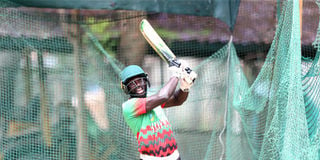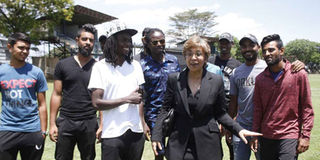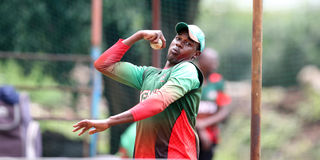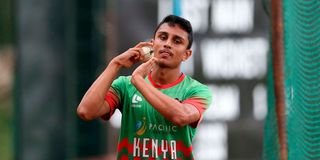Premium
Kenyan cricket pays dearly for 20 years of endless wrangles

Kenya's Neil Mugabe during their training session at the Ruaraka Sports Club on November 17, 2023.
What you need to know:
- In Windhoek, Kenya finished fourth in the six-team African qualifiers with three wins and three losses, as home team Namibia won the contest unbeaten to qualify alongside Uganda for the 2024 T20 Cricket World Cup
- Incessant leadership wrangles and dwindling performance saw Kenya miss out on the past three editions of the World Cup (2015, 2019 and this year’s edition held in India)
- Thomas Odoyo, the former explosive all-rounder, says that Kenya needs an advanced and high performance centre for national teams starting from the age group to the first team as well as cricket academies
Although agonising, failure by the national cricket team to qualify for the 2025 Twenty20 Cricket World Cup following losses to Namibia, Uganda and Zambia in the African qualifiers held in Windhoek last month was not shocking because Kenya has been on steady decline in both the short and long formats of the game.
In Windhoek, Kenya finished fourth in the six-team African qualifiers with three wins and three losses, as home team Namibia won the contest unbeaten to qualify alongside Uganda for the 2024 T20 Cricket World Cup that will be co-hosted by the United States of America, and West Indies from June 4-30 next year.
Uganda only lost to Namibia by six wickets after securing huge wins against Kenya (33 runs) and Zimbabwe (five wickets) to qualify for the World Cup for the first time.
Kenya last played in the T20 Cricket World Cup when the inaugural edition was held in South Africa in 2007. The team lost to Sri Lanka and New Zealand and failed to go past the group stages. Although Kenya has failed to qualify for the past seven editions, the latest failure is a bitter pill for fans because it came on the backdrop of a loss to Uganda in the qualifiers. Similarly, Kenya failed to qualify for 2022 T20 World Cup after losing to Tanzania and Uganda in the Africa Region Qualifiers played in 2021.
Kenya’s performance in the longer version of the game (50 overs) and the shorter version (T20) has been on a downward trajectory since 2003 when the country became the first team outside the Test Playing Nations to reach the semi-finals of the 2003 Cricket World Cup.
Kenya then made it to four successive Cricket World Cup in the longer version in 1996, 1999, 2003, 2007 and 2011, then cracks started emerging in the country’s cricket management. Incessant leadership wrangles and dwindling performance saw Kenya miss out on the past three editions of the World Cup (2015, 2019 and this year’s edition held in India).
The 1996 and 2003 editions remain the most memorable for Kenya. Kenya finished second behind the United Arab Emirates in the 1994 ICC Trophy held in Nairobi, thus qualifying for the 1996 World Cup, where they played in the same group with Australia, India, Sri Lanka, West Indies and Zimbabwe.
Kenya’s legends Steve Tikolo, Maurice Odumbe and Thomas Odoyo made the team for the 1996 World Cup in India. Minnows Kenya shocked former world champions West Indies by 73 runs.
Tikolo knocked 50 off 29 balls for Kenya’s tally of 166 all out but West Indies could only manage 93 with Odumbe picking three wickets off 15 balls.

Kenya's spin bowler and skipper Steve Tikolo in action during the ICC Intercontinental Cup one day match against Bermuda at Nairobi Gymkhana.
Kenya co-hosted the 2003 World Cup with Zimbabwe and South Africa, and beat Canada, Bangladesh and Sri Lanka as New Zealand forfeited its match against Kenya, giving the hosts victory. Kenya had done enough to qualify for the Super Six stage, becoming the first non-test nation to progress beyond the first round of the World Cup. In the Super Six stage, they lost to India and Australia, but stunned Zimbabwe by seven wickets, qualifying for the semi-final, where they lost to India by 91 runs.
Then leadership wrangles coupled with the national team players' strikes over allowance and salaries have dominated the scene rather than the game’s development. What was more devastating was when Cricket Kenya then Kenya Cricket Association (KCA) found itself battling most of the country's stakeholders.
Jimmy Rayani, who had served as KCA chairman from 1994 stepped down in 2003 and the late Sharad Ghai took charge but Sports Minister Ochillo Ayacko dissolved KCA, and put a transition committee in charge. Lawyer Samir Inamdar was elected KCA chairman in 2005, and he inherited a huge debt from the old office but no assets even as KCA rebranded to Cricket Kenya.
Standards of the game continued dwindling, and Inamdar was replaced by fellow lawyer Jackie Janmohammed in 2012 after serving for seven-and-a-half-years.
Janmohammed faced similar problems, and she resigned in 2018 but returned and was elected again in 2019, something that heightened the wrangles at Cricket Kenya as stakeholders challenged the legality of the election.

Former Cricket Kenya chairperson Jackie Janmohammed (centre) talks to the national cricket team players at the Nairobi Gymkhana club on November 5, 2018.
The country lost its prestigious One Day International (ODI) status in 2015 which it had held for 18 years after finishing outside the top four in the 2014 Cricket World Cup Qualifiers, effectively also failing to qualify for the 2015 Cricket World Cup.
Afterwards, top teams stopped touring Kenya, and ICC stopped giving Kenya meaningful matches.
Kenya performed poorly in the second-tier World Cricket League and was relegated to the World Cricket League Division III in 2018, effectively losing any hope of regaining the ODI status. ICC also stopped funding for CK’s activities which was estimated at between Sh60 million and Sh 70 million annually in August 2019 and demanded that a new constitution and office be put in place.
Sports Cabinet Secretary at the time, Amina Mohamed formed a Cricket Normalisation Committee chaired by retired Lady Justice Joyce Aluoch in March 2021. Cricket Kenya held fresh elections on February 26, last year, with Manoj Narshi Patel taking charge as chairman.
Kenya has since gone back to hosting international cricket matches after almost a decade. Nepal played a series of matches at the Nairobi Gymkhana Club ground in August last year, and ICC has resumed funding CK’s activities following a visit to the country by International Cricket Council (ICC) General Manager of Global Development, William Glenwright in August this year.

International Cricket Council (ICC) General Manager of Global Development, William Glenwright (left) speaks at a Nairobi hotel flanked by Cricket Kenya President Manoj Narshi Patel on August 29, 2023.
Steve Tikolo, who is arguably the best batman Kenya has ever produced, reckons that instability caused by leadership wrangles since 2003, lack of fighting spirit and motivation in the national team, and lack of proper development structures are the cause of the dwindled standards of the game in the country.
Thomas Odoyo, the former explosive all-rounder, says that Kenya needs an advanced and high performance centre for national teams starting from the age group to the first team as well as cricket academies.
Tikolo, who helped set up structures in Uganda between 2015 and 2020 after handling Kenya team in 2014 to 2015, says that the stroke that broke the camel's back has been a leadership wrangle for the last two decades.
“While we talk of bottom-up in governance, in sports administration it is the other way round,” said Tikolo, who is now in charge of the Nigeria Cricket team. “If there is good leadership from the top, the gains definitely trickle downward.”
Tikolo says personal egos and selfish interest must end if the current office led by Manoj is to stand a chance of rescuing the game.
“Let those battles for leadership give Manoj a chance. There is hope but we can’t make it with wrangles,” explains Tikolo, adding that at the end of the day, the game is what matters.
Tikolo notes that ICC, sponsors and foreign teams will keep Kenyan cricket at arm's length if wrangles continue, adding that Kenyan teams over the years and even the current squad lack the fighting spirit.
“They just play as if nothing is at stake and simply lack goals and interest,” explains Tikolo. “None of them will leave the field being proud to have put in 100 per cent.”

Kenya bowler Collins Obuya trains at Ruaraka Sports Club on November 17, 2023 ahead of the 2024 International Cricket Council (ICC) Men’s T20 World Cup Africa qualifiers set for November 22 to 30 in Namibia.
Tikolo says that players in the national team need to change their attitude, respect the technical bench p and avoid creating conflicts and rifts within.
“Cricket Kenya needs to form and support whoever they pick as coach and punish errant players, who think they are untouchable,” says Tikolo, adding that players need to look at themselves and reflect if they are doing justice to the game.
Tikolo advises CK and the government to make players welfare their top priority besides putting in place a robust training program for them.
“We need stability in the team and that can only be achieved if players are given long term contracts and quality build up matches,” says Tikolo.
Tikolo notes that no development programs were in place during their time, which led to a big vacuum when most of the top players retired. “Yes, players were treated well but the national office never bothered to invest in development at the grassroots. We were left bare when he hanged our bats and those who replaced us were still raw,” says Tikolo.
Tikolo says Manoj’s team must go down to the basics by introducing the age group leagues from Under-13 to Under-20 if Kenya is to regain its lost glory in the next five to 10 years.

Kenya cricket team bowler Vishil Patel trains at Ruaraka Sports Club on November 17, 2023 for 2024 International Cricket Council (ICC) Men’s T20 World Cup Africa qualifiers be held in Namibia, from November 22 to 30.
Talking about Kenya’s performance where they almost lost to Nigeria in the T20 World Cup qualifiers, Tikolo reckons he served Kenyan for two decades and watching them tumble in matches that they should be winning easily, makes him feel the pain.
Odoyo says that even though Kenya has grounds, they require high performance centres where there are nets and bowling simulation machines. “Our young players need to attend schools where cricket is played at a high level,“ says Odoyo, adding that players need to be trained at the short and long version of the game.
“You can’t continue blocking in T20 and expect to score runs,” notes Odoyo, who notes that players can’t be solely blamed if they can’t get quality opposition.

Kongonis Cricket Club's Emmanuel Bundi celebrates bowl out during their friendly match against Marylebone Cricket Club at Nairobi Club on November 4, 2023.
Maurice Odumbe notes that it will take great effort to get Kenya back to where it used to be.
“We must be open-minded and sincere to ourselves if we are really interested in rebuilding the game. We must put our differences aside,” says Odumbe. “We need to have a genuine conversation with stakeholders to chat the way forward.”
Odumbe says that those who were involved in the game at the highest level ought to be brought back to contribute to the development of the sport.
“It was heartbreaking and I felt like crying seeing Uganda beat Kenya. It makes me feel like taking the bat and going back to the crease for the last time,” notes Odumbe.





